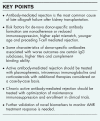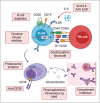Antibody-mediated rejection: prevention, monitoring and treatment dilemmas
- PMID: 35950887
- PMCID: PMC9475491
- DOI: 10.1097/MOT.0000000000001011
Antibody-mediated rejection: prevention, monitoring and treatment dilemmas
Abstract
Purpose of review: Antibody-mediated rejection (AMR) has emerged as the leading cause of late graft loss in kidney transplant recipients. Donor-specific antibodies are an independent risk factor for AMR and graft loss. However, not all donor-specific antibodies are pathogenic. AMR treatment is heterogeneous due to the lack of robust trials to support clinical decisions. This review provides an overview and comments on practical but relevant dilemmas physicians experience in managing kidney transplant recipients with AMR.
Recent findings: Active AMR with donor-specific antibodies may be treated with plasmapheresis, intravenous immunoglobulin and corticosteroids with additional therapies considered on a case-by-case basis. On the contrary, no treatment has been shown to be effective against chronic active AMR. Various biomarkers and prediction models to assess the individual risk of graft failure and response to rejection treatment show promise.
Summary: The ability to personalize management for a given kidney transplant recipient and identify treatments that will improve their long-term outcome remains a critical unmet need. Earlier identification of AMR with noninvasive biomarkers and prediction models to assess the individual risk of graft failure should be considered. Enrolling patients with AMR in clinical trials to assess novel therapeutic agents is highly encouraged.
Copyright © 2022 The Author(s). Published by Wolters Kluwer Health, Inc.
Conflict of interest statement
Figures



Similar articles
-
Treatment of Biopsy-Proven Acute Antibody-Mediated Rejection Using Thymoglobulin (ATG) Monotherapy and a Combination of Rituximab, Intravenous Immunoglobulin, and Plasmapheresis: Lesson Learned from Primary Experience.Clin Transpl. 2014:223-30. Clin Transpl. 2014. PMID: 26281149
-
Clazakizumab for the treatment of chronic active antibody-mediated rejection (AMR) in kidney transplant recipients: Phase 3 IMAGINE study rationale and design.Trials. 2022 Dec 22;23(1):1042. doi: 10.1186/s13063-022-06897-3. Trials. 2022. PMID: 36550562 Free PMC article. Clinical Trial.
-
Durable renal response after combination of bortezomib, corticosteroids, rituximab, and plasmapheresis for late antibody-mediated renal transplant rejection .Clin Nephrol. 2018 Apr;89(4):252-259. doi: 10.5414/CN109278. Clin Nephrol. 2018. PMID: 29208204
-
The Treatment of Antibody-Mediated Rejection in Kidney Transplantation: An Updated Systematic Review and Meta-Analysis.Transplantation. 2018 Apr;102(4):557-568. doi: 10.1097/TP.0000000000002049. Transplantation. 2018. PMID: 29315141
-
Donor-Specific Antibodies in Kidney Transplant Recipients.Clin J Am Soc Nephrol. 2018 Jan 6;13(1):182-192. doi: 10.2215/CJN.00700117. Epub 2017 Apr 26. Clin J Am Soc Nephrol. 2018. PMID: 28446536 Free PMC article. Review.
Cited by
-
Inhibition of inflammation by IL-6 blockade in xenotransplantation.Cytokine. 2025 May;189:156897. doi: 10.1016/j.cyto.2025.156897. Epub 2025 Feb 24. Cytokine. 2025. PMID: 39999679 Review.
-
IL-2 Complex Therapy Mitigates Humoral Rejection of Fully Mismatched Skin Allografts by Inhibiting IgG Alloantibody Formation.Cells. 2025 Jul 16;14(14):1086. doi: 10.3390/cells14141086. Cells. 2025. PMID: 40710339 Free PMC article.
-
Novel Therapeutic Approaches in the Management of Chronic Kidney Disease.Biomedicines. 2023 Oct 11;11(10):2746. doi: 10.3390/biomedicines11102746. Biomedicines. 2023. PMID: 37893119 Free PMC article. Review.
-
Immunomodulatory Effect of COVID-19 on HLA-Antibody Profile in Renal Transplant Recipients.J Clin Med. 2024 Apr 19;13(8):2383. doi: 10.3390/jcm13082383. J Clin Med. 2024. PMID: 38673655 Free PMC article.
-
Transcriptomic signatures of chronic active antibody-mediated rejection deciphered by RNA sequencing of human kidney allografts.Kidney Int. 2024 Feb;105(2):347-363. doi: 10.1016/j.kint.2023.11.012. Epub 2023 Nov 29. Kidney Int. 2024. PMID: 38040290 Free PMC article.
References
-
- Sellarés J, de Freitas DG, Mengel M, et al. . Understanding the causes of kidney transplant failure: the dominant role of antibody-mediated rejection and nonadherence. Am J Transplant 2012; 12:388–399. - PubMed
-
- Wiebe C, Gibson IW, Blydt-Hansen TD, et al. . Evolution and clinical pathologic correlations of de novo donor-specific HLA antibody post kidney transplant. Am J Transplant 2012; 12:1157–1167. - PubMed
-
- El-Zoghby ZM, Stegall MD, Lager DJ, et al. . Identifying specific causes of kidney allograft loss. Am J Transplant 2009; 9:527–535. - PubMed
-
- Haas M, Loupy A, Lefaucheur C, et al. . The Banff 2017 Kidney Meeting Report: revised diagnostic criteria for chronic active T cell-mediated rejection, antibody-mediated rejection, and prospects for integrative endpoints for next-generation clinical trials. Am J Transplant 2018; 18:293–307. - PMC - PubMed
Publication types
MeSH terms
Substances
Grants and funding
LinkOut - more resources
Full Text Sources
Other Literature Sources
Medical
Research Materials

